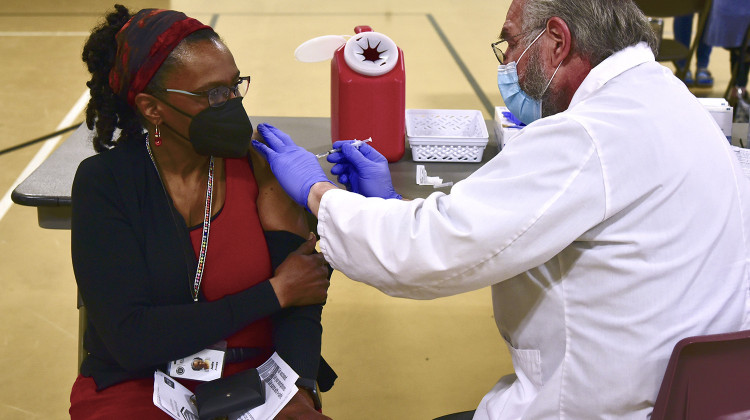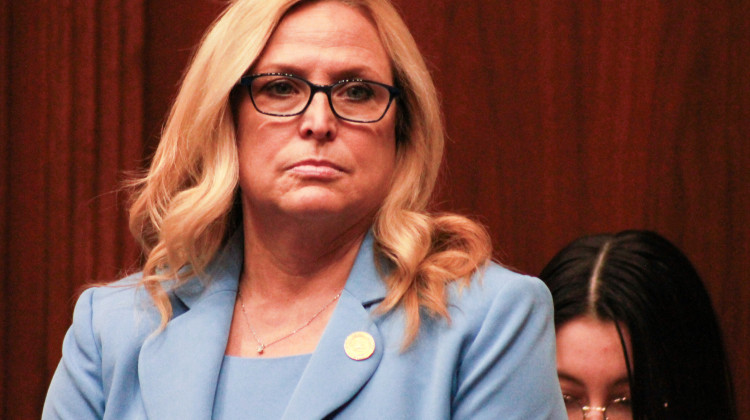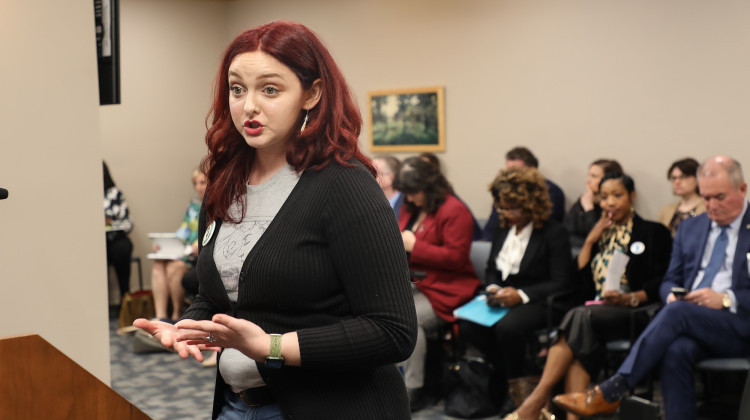The Indiana State Department of Health reported 26 additional confirmed deaths on Wednesday, bringing the state’s total to 1,508. The state announced more than 26,000 total confirmed cases, with more than 160,000 Hoosiers tested.
New Claims Continue To Fall But Unemployment In Indiana May Still Be Growing
A little more than 30,000 Hoosiers applied for unemployment benefits last week as the economic impact of COVID-19 drags on. That adds to the quarter of a million people who continue to get unemployment benefits from the state.
The number of people opening a new unemployment claim continues to decrease since peaking in late March. But available data shows the total number of people now receiving unemployment benefits each week is still growing.
READ MORE: Governor Holcomb Outlines How – And Why – The State Will Reopen
Join the conversation and sign up for the Indiana 2020 Two-Way. Text "elections" to 73224. Your comments and questions in response to our weekly text help us find the answers you need on COVID-19 and the 2020 election.
You Asked How Faith Communities Are Preparing To Reopen. We’ve Got Answers.
Members of the Indiana 2020 Two-Way asked us how different places of worship and religious organizations are approaching reopening in-person services. To join, text “elections” to 73224.
So, Indiana Public Broadcasting and All IN went to work to answer some of those questions by gathering a panel of experts, including: Bishop Jennifer Baskerville-Burrows, Episcopal Diocese of Indianapolis; Fatima Hussain, president of the Muslim Alliance of Indiana; Rabbi Mike Harvey, Temple Israel in West Lafayette; and Tim Shapiro, president of the Center for Congregations.
What are religious organizations telling faith leaders?
The Episcopal Diocese of Indianapolis is allowing people to return to buildings to live stream services at the end of the month. But Bishop Baskerville-Burrows says she’s encouraging people to stay home and continue to live stream services from home, as they’ve done for the past two months.
“I’m particularly aware – as bishop of an area that covers counties throughout central and southern Indiana – when we gather in close proximity, as we often do as religious bodies, that we are high intensity, high contact type people. And we can be super-spreaders without knowing it,” Baskerville-Burrows says.
As long as the data shows a decrease, Episcopal churches in the diocese will be allowed to reopen – with 25 or fewer people – in mid-June.
Rabbi Harvey says he’s relying on interfaith conversations to make decisions.
“Individual faith leaders – we shouldn’t have to make these decisions on our own, we should rely on the strength of the other people around us,” Harvey says.
He’s a member of Interfaith Leaders of Greater Lafayette. Harvey says he’s talking to other religious leaders to help navigate COVID-19’s “new normal.”
Muslim Alliance of Indiana President Fatima Hussain says mosques across Indiana have also been adapting. Mosques operate independently. But her organization has gathered these faith leaders in a commitment to safety moving forward – relying especially on health professionals in individual congregations to help guide them moving forward.
READ MORE: All IN: How Are Faith Groups Making It Work?
Hussain says mosques were already canceling services before the “Stay-At-Home” order was issued – which is particularly hard for the holiday it overlapped with: Ramadan.
“In Ramadan, typically mosques hold nightly prayers that are completely voluntary, and yet, mosques are more full at that time of year than anything,” Hussain says. “So letting go of that reality was difficult.”
She says local and national leaders encouraged Muslims to observe Ramadan – fasting, giving to charity and prayer – without potentially spreading the virus.
ISTA: Compensation Still Critical, Especially If Teachers Leave Due To COVID-19
Teacher compensation was shaping up to be a hot ticket policy item for lawmakers in 2021, after thousands of educators flooded the Statehouse six months ago to highlight teachers’ and public schools’ financial needs.
Then, COVID-19 hit and brought much of the world to a halt, including revenue streams that touch all levels of government.
But Indiana State Teachers Association President Keith Gambill says addressing teacher compensation statewide remains critical.
One concern in the coming months is the number of teachers who may retire, whether because of a lack of increasing pay, the pandemic, or both.
“And we have to be very careful because if that were to go up too quickly, we don’t have enough folks in the pipeline to fill in,” he says.
Greene Co. Nursing Home Hit Hard By COVID-19 Releases Case, Death Statistics
COVID-19 deaths at nursing homes and long-term care facilities account for more than one-third of Indiana's confirmed and presumed virus death toll.
Last month, Indiana ordered nursing homes to communicate with residents and families daily about any COVID-19 cases in their facilities.
But Greene County's Glenburn Home is going one step further — it's providing the public with detailed daily updates about the number of coronavirus cases, deaths and recoveries among its residents and employees.
The daily reports, shared on Glenburn's website and on Facebook, detail not only cases and deaths, but recovery statistics and whether patients are at home or in the hospital.
Wednesday, Glenburn reported 15 confirmed deaths and one suspected COVID-19 death. In total, the facility says it has seen 75 positive cases and 28 recoveries among residents, as well as 15 positive cases and 14 recoveries among employees.
Community Health Network Reports Positive Trends
Hospitals in central Indiana are a key part of the COVID-19 response. Community Health Network has now charted some positive trends.
Community treated its first patient March 6, and it was preparing for COVID-19 for weeks before that. Chief Physician Executive Dr. Ram Yeleti, who also contracted and recovered from the virus in April, says now they are seeing less emergency visits and hospitalizations.
"I think those are stabilizing and the less acute patients are probably not coming in – is what we’re seeing right now," says Yeleti.
He says its highest percentage of beds with COVID-19 patients was 20 percent, and it is 15 percent now. He says they had similar percentages for ventilators with about 20 percent in use now.
Yeleti says he’s concerned that people aren’t coming in for other needed health care because they are concerned about being exposed to COVID-19.
Monroe Co. To Move Into Stage 2 Of Governor's Plans To Reopen With Some Alterations
Monroe County health officials are moving the county into stage two of Gov. Eric Holcomb’s plans for reopening the state’s economy.
The order is effective Saturday, May 16.
The county will have a few alterations from the governor’s plan, opting to remain in phase two until May 31 – a week longer than most of the state.
Dining and personal services can reopen immediately Saturday under the local order at 50 percent capacity, rather than waiting a week from when the order goes into effect.
Contact Lauren at lchapman@wfyi.org or follow her on Twitter at @laurenechapman_.
This is a rapidly evolving story, and we are working hard to bring you the most up-to-date information. However, we recommend checking the websites of the Centers for Disease Control and Prevention or the Indiana State Department of Health for the most recent numbers of COVID-19 cases.
 DONATE
DONATE







 Support WFYI. We can't do it without you.
Support WFYI. We can't do it without you.